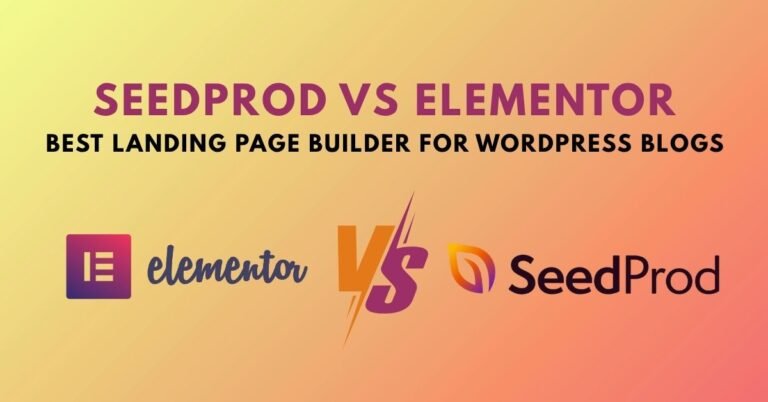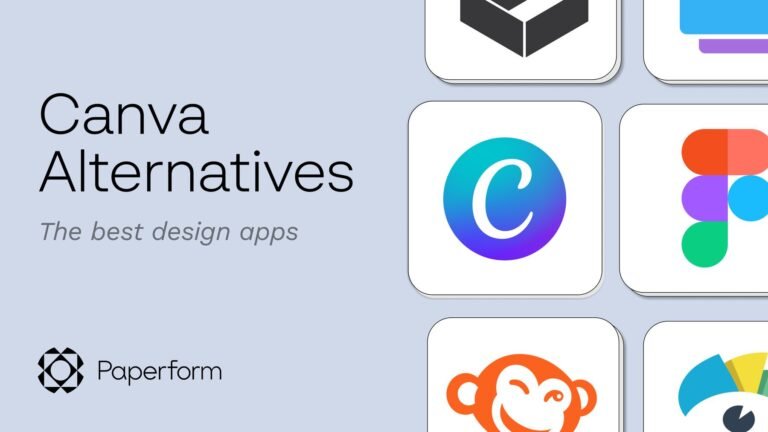Keyword research is one of the most crucial skills for any blogger who wants to rank on Google and grow their traffic. If you’re just starting your blogging journey, you might feel overwhelmed by the number of tools out there. Don’t worry—this guide will walk you through the best keyword research tools for bloggers, whether you’re looking for free options or investing in premium solutions.
Whether you’re writing your first blog post or optimizing an old one, choosing the right keywords can make the difference between getting 10 visitors or 10,000.
Let’s explore the top 10 keyword research tools that every blogger should know about.
Why Keyword Research Matters for Bloggers
Before we jump into the tools, here’s why keyword research is non-negotiable:
- Helps you understand what your audience is searching for
- Increases chances of ranking higher on Google
- Avoids writing blog posts that no one searches for
- Guides your content strategy and blog topics
- Maximizes organic traffic without paid ads

Google Keyword Planner (Free)
If you’re looking for a free and reliable tool straight from Google itself, Keyword Planner is a great place to start.
Features:
- Find new keywords by entering a topic or URL
- View search volume, competition level, and CPC
- Ideal for beginners and paid search advertisers
Pros:
- 100% free
- Trusted Google data
- Great for high-level research
Cons:
- Not very detailed for SEO
- Doesn’t show exact volume without ads running
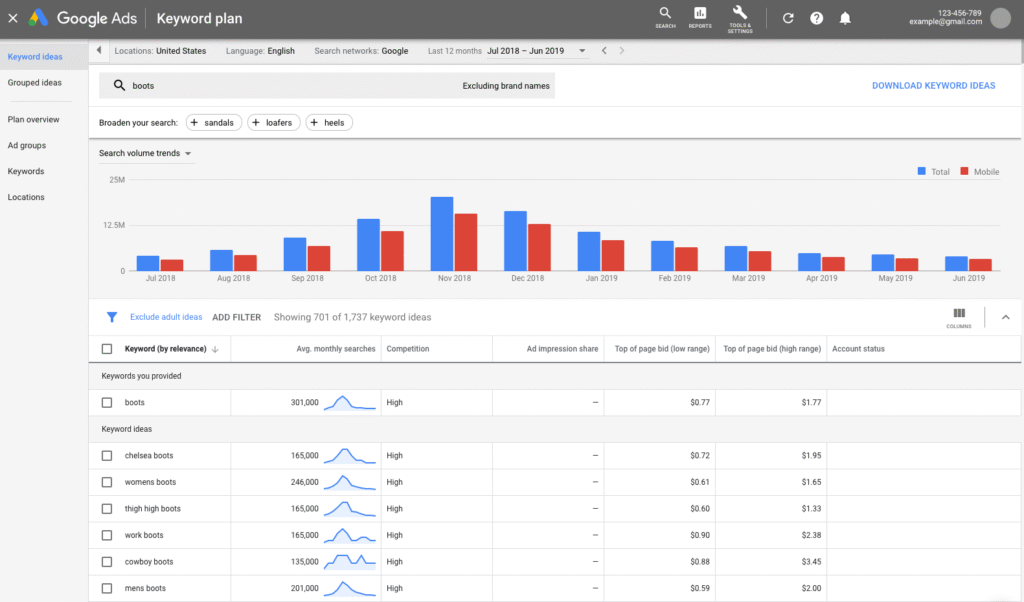
Ubersuggest by Neil Patel (Free + Paid)
Ubersuggest offers a friendly interface with tons of helpful features for beginner bloggers.
Features:
- Keyword ideas and long-tail variations
- SEO difficulty and domain score
- Competitor keyword spying
Free Plan Limit: Limited daily searches
Paid Plan: Starts at $12/month
Best For: Beginners who want easy-to-understand insights

Ahrefs (Paid)
Ahrefs is one of the most powerful SEO tools out there, used by professionals and businesses alike.
Features:
- Massive keyword database
- Accurate traffic and difficulty metrics
- Organic keywords for any website
- Content gap analysis
Pricing: Starts at $99/month
Pros:
- In-depth competitor research
- Reliable data and UI
- Perfect for scaling your blog
Cons:
- No free plan
- Expensive for beginners
SEMrush (Paid)
Another all-in-one SEO suite, SEMrush is great for content planning, keyword research, and more.
Features:
- Keyword Magic Tool for long-tail suggestions
- Competitor keyword tracking
- SEO Writing Assistant
Pricing: Starts at $129/month
Best For: Bloggers scaling their SEO game or agencies

AnswerThePublic (Free + Paid)
This tool visualizes keyword ideas as questions, comparisons, and prepositions.
Features:
- Organizes keywords into question formats
- Great for blog content inspiration
- Visual keyword mapping
Free Plan: Limited searches
Pro Plan: Starts at $9/month
Best For: Discovering question-based keywords
Keywords Everywhere (Freemium Chrome Extension)
A browser add-on that shows search volume, CPC, and competition right on Google search results.
Features:
- Overlay keyword metrics directly in SERP
- Supports YouTube, Amazon, and more
- Shows related and trending keywords
Free Plan: Basic features
Credits-based system for premium features
Best For: On-the-fly keyword research without switching tools
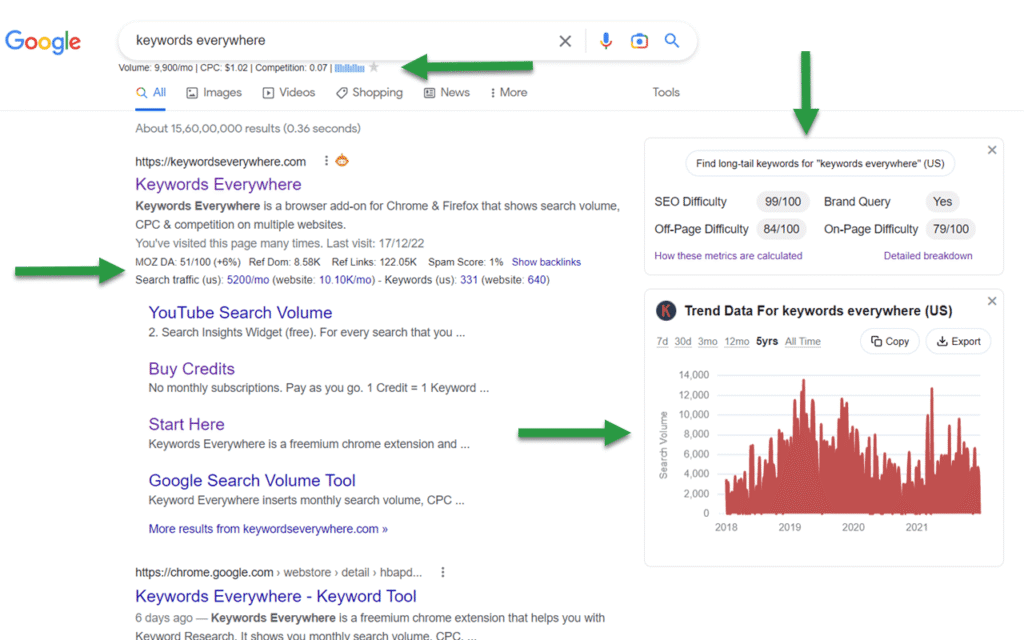
Moz Keyword Explorer (Free + Paid)
Moz is a trusted name in the SEO industry and its keyword tool is perfect for bloggers.
Features:
- Keyword suggestions and SERP analysis
- Priority score based on opportunity
- Organic CTR prediction
Free Plan: 10 searches/month
Paid Plan: Starts at $99/month
Best For: Bloggers looking for quality keyword scoring
Surfer SEO (Paid)
While Surfer is known for content optimization, it also includes a helpful keyword research tool.
Features:
- Content Planner suggests clusters of related keywords
- Integration with Google Docs and WordPress
- Real-time SEO suggestions
Pricing: Starts at $29/month
Best For: Bloggers focused on creating optimized content that ranks
Soovle (Free)
Soovle is a fun and simple tool that aggregates keyword suggestions from multiple platforms like Google, Amazon, YouTube, and more.
Features:
- Great for brainstorming blog post ideas
- Pulls real-time data from top search engines
Best For: Quick, multi-platform keyword ideas

KWFinder by Mangools (Free Trial + Paid)
Known for its beautiful interface and beginner-friendly features, KWFinder is an underrated gem.
Features:
- Search volume, CPC, difficulty score
- SERP overview with domain metrics
- Historical keyword trends
Free Trial: 5 lookups/day
Paid Plan: Starts at $29.90/month
Best For: Bloggers who prefer intuitive, visual tools
Comparison Table: Best Keyword Tools for Bloggers
| Tool | Free Plan | Paid Plan Starts | Best For |
|---|---|---|---|
| Google Keyword Planner | ✅ | — | Basic keyword data |
| Ubersuggest | ✅ | $12/mo | Beginners and bloggers |
| Ahrefs | ❌ | $99/mo | Pro bloggers and agencies |
| SEMrush | ❌ | $129/mo | SEO agencies and advanced bloggers |
| AnswerThePublic | ✅ | $9/mo | Content ideas and blog topics |
| Keywords Everywhere | ✅ | Credit system | Quick SERP data |
| Moz | ✅ | $99/mo | SERP analysis with scoring |
| Surfer SEO | ❌ | $29/mo | Content-focused bloggers |
| Soovle | ✅ | — | Idea generation across platforms |
| KWFinder | ✅ (Trial) | $29.90/mo | Beginner-friendly keyword research |
Tips for Choosing the Right Keyword Tool
Not sure which one to choose? Here are some quick tips:
- Just starting out? Start with Ubersuggest, Keywords Everywhere, or Google Keyword Planner
- Need competitor insights? Go with Ahrefs or SEMrush
- Looking for content ideas? Try AnswerThePublic or Soovle
- Budget-conscious? Stick to free tools and upgrade when needed
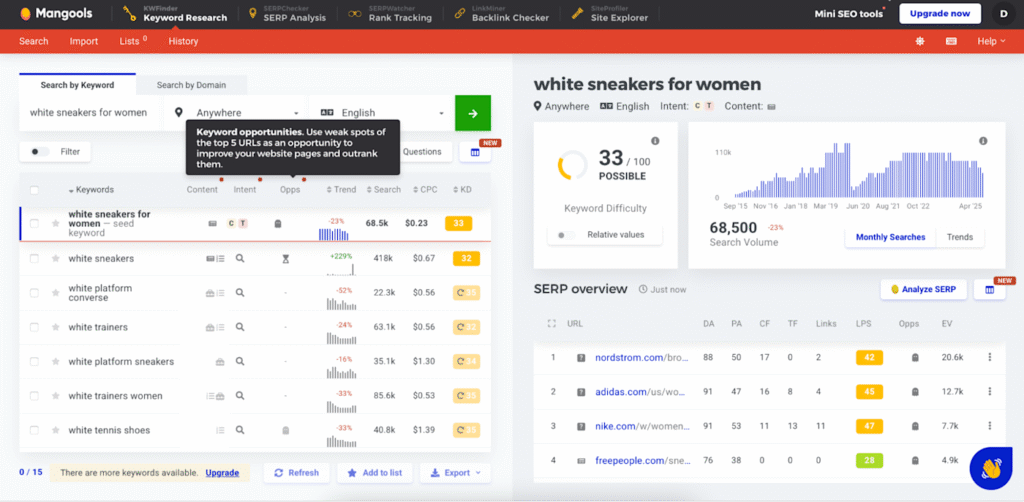
Final Thoughts
Keyword research is the backbone of successful blogging. Whether you’re a new blogger trying to find your first traffic-driving post or a seasoned creator optimizing old content, the tools listed above will help you find the right keywords, beat the competition, and grow your blog audience.
Start small, experiment with free tools, and upgrade as your blog scales.
FAQ: Keyword Research for Bloggers
Focus on one main keyword and 2–3 related keywords. Avoid keyword stuffing.
Not necessarily. Many free tools offer great value for beginners. As your blog grows, premium tools may be worth the investment.





